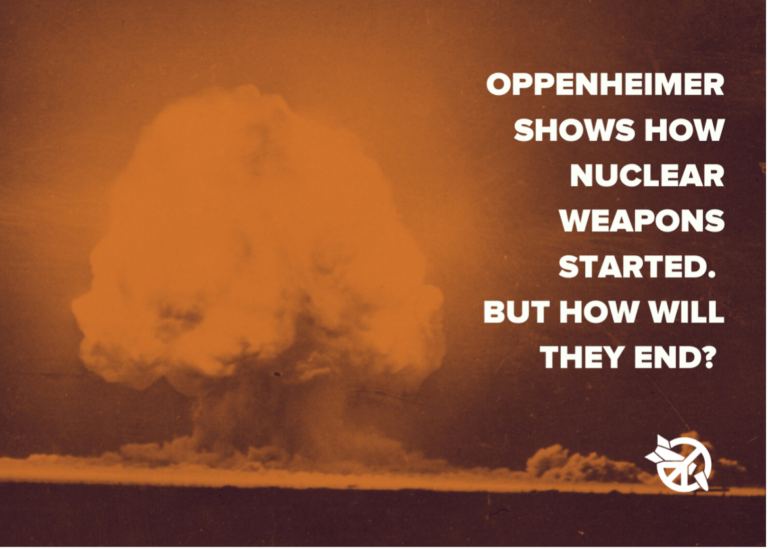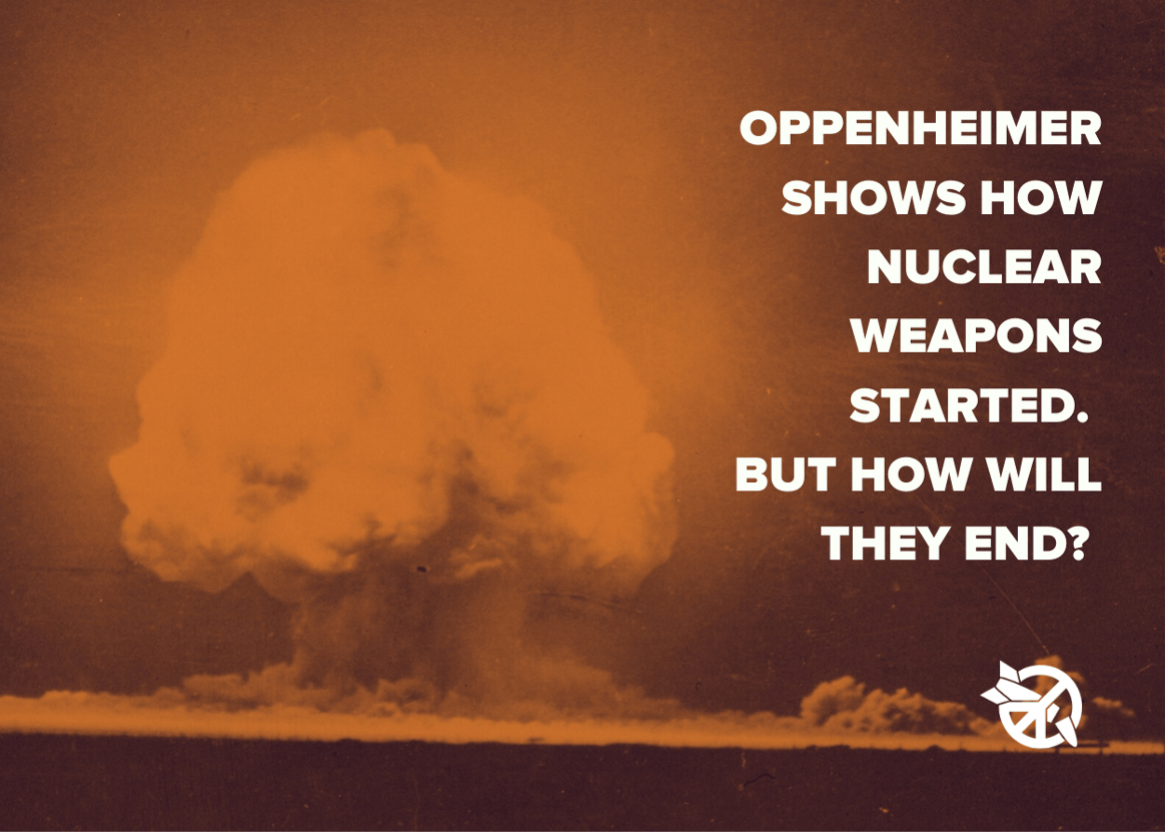
[ad_1]
UNITED NATIONS, Apr 10 (IPS) – The award-winning Hollywood movie Oppenheimer portrays the life of J. Robert Oppenheimer, who helped create the atomic bomb, which claimed the lives of an estimated 140,000 to 226,000 people and devastated the two Japanese cities of Hiroshima and Nagasaki in August 1945.
The tragedy was best described as a humanitarian disaster of Biblical proportions. But the film focuses on the creation of the bombs, not the devastation it caused.
In a Time magazine piece last February, Jeffrey Kluger recounts a meeting at the White House between US President Harry S. Truman and Oppenheimer, aptly describing it as “the man who built the bombs and the man who dropped the bombs.”
Suffering from an unforgivable guilt, Oppenheimer reportedly told Truman, “Mr. President, I feel I have blood on my hands.”
But history recalls just what happened next differently, says Time.
Truman apparently said, “Never mind, it’ll come out in the wash.”
Or another story, where an unrepentant Truman hands a handkerchief to Oppenheimer and says, “Well here, would you like to wipe your hand?”
In the film, Truman merely brandishes the handkerchief.
A former Hiroshima mayor, Takashi Hiraoka, who spoke at a preview event for the film, was more critical of what was omitted from the movie.
He was quoted as saying: “From Hiroshima’s standpoint, the horror of nuclear weapons was not sufficiently depicted. The film was made in a way to validate the conclusion that the atomic bomb was used to save the lives of Americans.”
The International Campaign to Abolish Nuclear Weapons (ICAN) said the release of the Oppenheimer film, and the wave of (media) attention surrounding it, creates an opportunity to spark public attention on the risks of nuclear weapons and invite new audiences to get involved in the movement to abolish nuclear weapons.
“We can educate about the risks, and share a much-needed message of hope and resistance: Oppenheimer is about how nuclear weapons began, the UN Treaty on the Prohibition of Nuclear Weapons (TPNW) is how we end them.”
Speaking of the historical perspective, Dr Alon Ben-Meir, a retired professor of international relations at the Center for Global Affairs at New York University (NYU), told IPS that the Manhattan Project, which was spearheaded by Oppenheimer to develop a nuclear weapon, started while the Second World War was raging and Germany had been on the march, conquering one country after another in Europe.
However, by the time the nuclear weapon was developed, Germany had surrendered, but Japan continued to fight. Based on documented historical accounts, Japanese forces were fighting in every trench, in every front, to the last soldier, and the word’surrender’ was not in their vocabulary, he said.
General Marshall, who was Chief of Staff of the US Army, provided counsel to President Truman at the time that if the war were to continue for another one to two years, hundreds of thousands of American soldiers and perhaps more than a million Japanese would be killed.
When Truman asked what he would suggest, General Marshall and others indicated that bombing one or even two sites in Japan with a nuclear weapon could bring the war to a swift conclusion and save the lives of millions from both sides.
Truman was finally persuaded that this may be the only solution, specifically given that the Japanese were determined to fight until the bitter end, said Ben-Meir, who taught courses on international negotiation and Middle Eastern studies for over 20 years.
“Once the bombs were dropped and Oppenheimer realized the extent of the damage and death that occurred in Hiroshima and Nagasaki, he felt personally responsible for the catastrophic impact of the bomb, stating to President Truman that he felt that he had blood on his hands because of what happened.”
Truman then told Oppenheimer that although he was behind the development of the nuclear weapon, the decision to use it was his own, and Oppenheimer bore no responsibility whatsoever.
President Truman allegedly handed Oppenheimer his handkerchief to presumably wipe his hands off the bloodstains. Nevertheless, Oppenheimer left the president’s office completely distraught, said Ben-Meir.
“The Japanese do not believe that Truman was concerned about the potential loss of Japanese lives had the war continued, but was mainly concerned about American lives. This sadly remains a point of contention but was mostly overcome due to the strong alliance that was subsequently developed between the US and Japan.”
Of course, what compounded Oppenheimer’s profound despair over what happened was that he was subsequently accused of being a member of the Communist Party and had his security clearance revoked, ending his work with the US government (he was posthumously exonerated), declared Ben-Meir.
Broadly, though, according to National Public Radio (NPR), many Japanese viewers expressed discomfort with Oppenheimer’s storytelling and felt the portrayal was incomplete.
“The film was only about the side that dropped the A-bomb,” Tsuyuko Iwanai, a Nagasaki resident, told NPR. “I wish they had included the side it was dropped on.”
Upon witnessing the first successful nuclear test, Oppenheimer reportedly quoted from the Hindu scripture Bhagavad Gita: “Now I am Death: the destroyer of the worlds,” according to UNFOLD ZERO, a platform for UN focused initiatives and actions for the achievement of a nuclear weapons-free world.
“Indeed, Oppenheimer was so impacted by the potential of the nuclear bomb to destroy the world that, following the end of the Second World War, he became deeply involved in international nuclear weapons control, peace and the promotion of world governance”.
“The movie should remind us of how important and relevant these ideas are today—as wars are raging, tensions between nuclear armed States are increasing and the threat of nuclear war is as high as it has ever been,” said UNFOLD ZERO.
“The thinking, passion and commitment of Oppenheimer regarding these issues is barely touched upon in the movie, despite it being so important today for re-awakening our collective understanding of the nature of nuclear deterrence, the risks of nationalism and the importance to strengthen the rule of law, prevent nuclear war and achieve peace through global governance.”
Addressing the UN Security Council on March 18, Secretary-General António Guterres referred to the movie, which won seven Oscars at the Hollywood Academy Awards ceremony on March 10, including the four major awards for Best Picture, Best Director, Best Actor and Best Supporting Actor.
“The Doomsday Clock is ticking loudly enough for all to hear. From academics and civil society groups, calling for an end to the nuclear madness,” he said.
“To Pope Francis, who calls the possession of nuclear arms ‘immoral’. To young people across the globe worried about their future, demanding change. To the Hibakusha, the brave survivors of Hiroshima and Nagasaki—among our greatest living examples of speaking truth to power—delivering their timeless message of peace.”
Humanity cannot survive a sequel to Oppenheimer, Guterres warned.
This article is brought to you by IPS Noram, in collaboration with INPS Japan and Soka Gakkai International, in consultative status with UN ECOSOC.
IPS UN Bureau Report
Follow @IPSNewsUNBureau
Follow IPS News UN Bureau on Instagram
© Inter Press Service (2024) — All Rights ReservedOriginal source: Inter Press Service
[ad_2]
